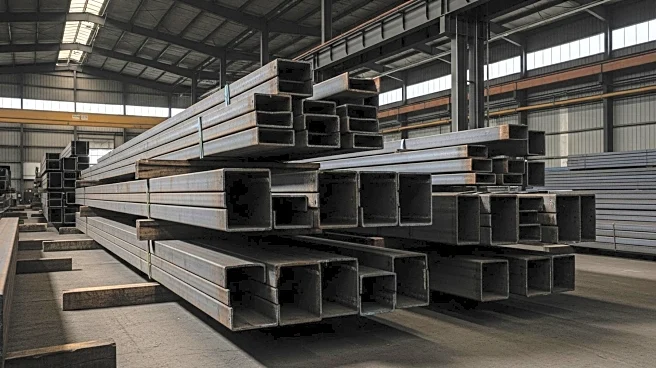What is the story about?
What's Happening?
The European Union has announced a significant increase in steel import tariffs, doubling them to 50%. This decision aims to curb global overproduction and protect Europe's struggling steel sector. While African exporters are largely exempt from these new measures, the continent may still face challenges as redirected steel from major producers could flood regional markets. The EU's move primarily targets countries like China, India, and Turkey, but developing nations, including several African countries, benefit from exemptions due to their lower export volumes. Despite this relief, there are concerns that the influx of cheap steel could undermine domestic industries and slow industrial growth in Africa.
Why It's Important?
The EU's tariff increase could have significant implications for African economies. As major steel producers redirect their excess supply to emerging markets, Africa's infrastructure boom and the African Continental Free Trade Area (AfCFTA) create fresh demand, making the region an attractive target for surplus steel. This situation poses a risk to Africa's growing domestic industries, potentially undercutting local producers and affecting long-term industrial ambitions. The EU's protectionist measures highlight the need for coordinated policy responses in Africa to safeguard its economic interests and support sustainable growth.
What's Next?
African countries may need to implement strategic measures to protect their domestic steel industries from the potential influx of cheap imports. Industry leaders in South Africa have already urged the government to act swiftly to mitigate the impact of global trade shifts. As the EU's protectionism continues, African nations might explore policy responses to strengthen their industrial sectors and enhance competitiveness. Collaborative efforts within the AfCFTA framework could also play a crucial role in addressing these challenges and promoting regional economic stability.
Beyond the Headlines
The EU's decision reflects broader global trade dynamics and the challenges faced by developing countries in navigating protectionist policies. Africa's response to these measures could influence its future trade relationships and economic strategies. The situation underscores the importance of regional cooperation and policy innovation in addressing external economic pressures. As Africa seeks to balance its industrial growth with global trade shifts, the continent's approach may serve as a case study for other regions facing similar challenges.















